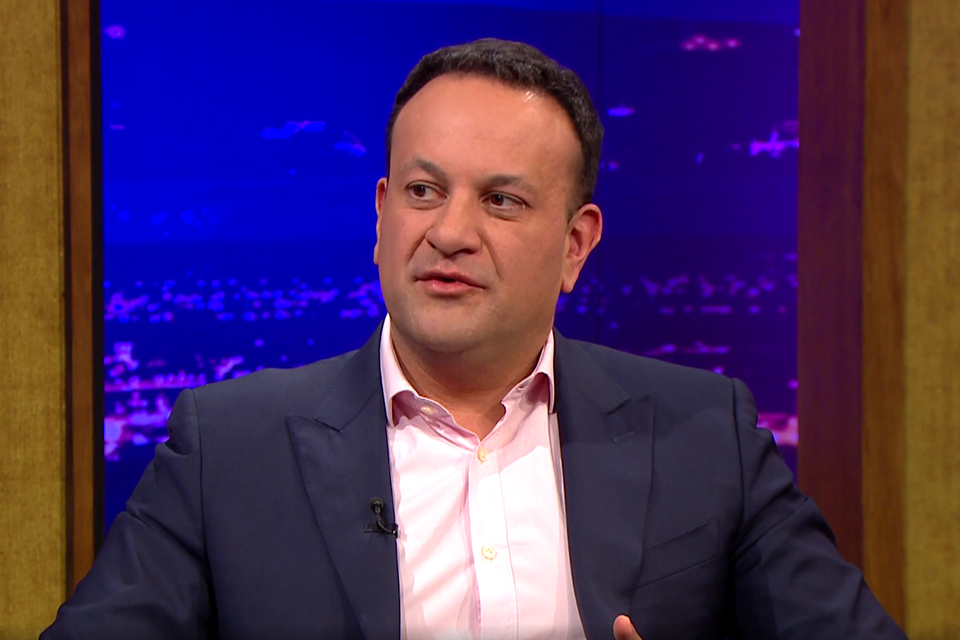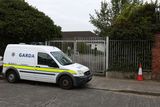‘I nearly chickened out the night before’ – says Leo Varadkar on stepping down as Taoiseach on The Late Late Show
Leo Varadkar on the Late Late Show
Leo Varadkar has said he almost “chickened out the night before” stepping down as Fine Gael party leader and Taoiseach.
Mr Varadkar caused a political earthquake when he made the surprise announcement that he was vacating his roles as party leader and head of government last month, leading to Simon Harris becoming Ireland’s youngest-ever Taoiseach at the age of 37.
"I nearly chickened out the night before… but it was definitely the right decision for me and hopefully the right decision for the country,” he told Patrick Kielty on the Late Late Show.
“It was something I was thinking about for a few months but only definitely made the decision in the days beforehand. I was thinking back to 2017, when I first became Taoiseach, and I was at a meeting of the 27 EU prime ministers and there are only three or four of us left and most of us are now going out of politics.
"Another former prime minister once told me there are only three ways to cease being leader of your country; you either die, lose or resign. And if you don’t die or lose, you have to resign,” Mr Varadkar said.
"That was a hard decision to make to say to yourself that you're not actually the right person to bring things forward. But I came to that conclusion and that it needed somebody [else] after me spending 13 years in government, there was a need for a reset”.
‘New chapter’ in Varadkar’s life as Ireland selects new premier
Mr Varadkar said he had not made a decision as to whether he will run in the next general election in Dublin West and said that he will wait eight to 10 weeks to make a final decision after he sees how his party does in the local and European elections on June 7.
He suggested senator Emer Currie as a possible replacement for him in the constituency, saying: “There are four male TDs in the constituency – three of us are gay, there must be something in the water there – but I would also like to see a woman get elected there”.
In the wide-ranging interview, Mr Varadkar said the rise of the “populist right” was a concern for Ireland and said that immigration was “always going to become centre-stage in Irish politics”.
"It’s just the way politics is going. We saw it for Donald Trump’s election in 2016 when he was going to build the wall and all of that bizarre stuff. We saw it [in the UK] and they have their rather strange Rwanda plan in which they’ve spent €500m but not sent a single person back yet,” he said.
Mr Varadkar said friends of his who have biracial children in Ireland are now worrying about their children due to racism in Ireland for the first time. He said he particularly felt this as when he grew up in Blanchardstown as the son of an Indian doctor, he was “the only child a little darker and with a funny last name”.
He went on to suggest a limit for leadership terms in Ireland was not such a bad idea, looking back on his 13 years in government.
“When you’re Taoiseach, you’re Taoiseach all of the time. It is very long hours, it is most evenings, most weekends. You’re always on and you’re always concerned and worrying about the problems that the country faces and people face and the time ahead,” he said.
“That that shouldn’t be forever, and you know, one thing they have in America for the top job, president, governor, is an eight-year term limit, and maybe that’s not such a bad idea.”
Asked whether he thinks he was a good Taoiseach, Mr Varadkar said that will be for others to judge in the fullness of time.
“It’s too soon I think to make those kind of conclusions. You have to see what comes next over the next three, four or five, six years to know for sure,” he said.
Asked what he regretted, Mr Varadkar said he felt the government had been too cautious in 2011 following the financial crash.
“The economy bounced back way quicker than we thought … and we held back on some spending decisions, and we held back on some investment decisions. A lot of the new houses you see being built now, or some of the new transport improvements that are about to come online, could have happened five years ago had we known what we know now,” he said.
“The progress that we’re now seeing could have been much further along and then you would see a better situation with housing, a better situation with health. But that’s hindsight and hindsight is 20/20.”
Join the Irish Independent WhatsApp channel
Stay up to date with all the latest news















